The global generative AI in chemical market is anticipated to rise from USD 1.4 billion in 2025 to approximately USD 47.3 billion by 2035, recording an absolute increase of USD 45.9 billion over the forecast period. This translates into a total growth of 3,209.4%, with the market forecast to expand at a compound annual growth rate (CAGR) of 41.9% between 2025 and 2035. The overall market size is expected to grow by nearly 33.1X during the same period, supported by the rising adoption of AI-powered chemical research and development and increasing demand for accelerated molecular discovery across pharmaceutical and chemical industries worldwide.
Between 2025 and 2030, the generative AI in chemical market is projected to expand from USD 1.43 billion to USD 8.95 billion, resulting in a value increase of USD 7.52 billion, which represents 16.4% of the total forecast growth for the decade. This phase of growth will be shaped by rising investment in AI-powered research and development, increasing adoption of machine learning algorithms for molecular discovery, and growing demand for accelerated chemical synthesis optimization. Technology providers are expanding their AI capabilities to address the growing complexity of chemical research requirements across pharmaceutical and specialty chemical applications.
From 2030 to 2035, the market is forecast to grow from USD 8.95 billion to USD 47.33 billion, adding another USD 38.38 billion, which constitutes 83.6% of the overall ten-year expansion. This period is expected to be characterized by widespread deployment of advanced generative models, integration of quantum computing with molecular design, and development of comprehensive AI platforms for chemical manufacturing optimization. The growing emphasis on sustainable chemistry and personalized medicine will drive demand for more sophisticated AI solutions with enhanced predictive accuracy and automated synthesis planning capabilities.
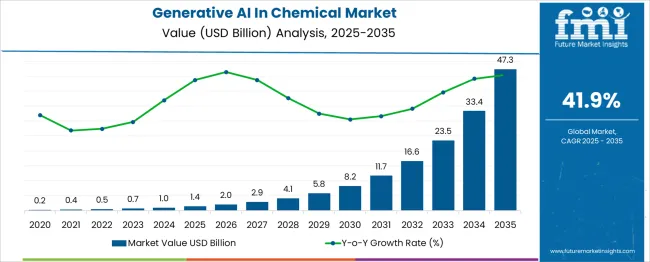
| Metric | Value |
|---|---|
| Estimated Value in (2025E) | USD 1.4 billion |
| Forecast Value in (2035F) | USD 47.3 billion |
| Forecast CAGR (2025 to 2035) | 42% |
Market expansion is being supported by the rapid increase in pharmaceutical research and development costs and the corresponding need for AI-powered solutions that can accelerate molecular discovery and reduce time-to-market for new chemical compounds. Modern chemical research relies on generative AI to explore vast chemical space, predict molecular properties, and optimize synthesis pathways that would be impossible to investigate through traditional experimental approaches. The growing complexity of drug development and increasing emphasis on precision medicine are driving demand for advanced AI technologies from certified providers with appropriate computational expertise and validated algorithms.
The expanding need for sustainable chemical processes and rising environmental regulations are creating significant demand for AI solutions that can optimize reaction conditions, reduce waste generation, and identify environmentally friendly synthesis alternatives. Government initiatives promoting digital transformation in chemical industries are establishing new frameworks that support AI adoption and require comprehensive data analytics capabilities for regulatory compliance and innovation acceleration.
The market is segmented by technology, application, and region. By technology, the market is divided into machine learning, generative models (GAN & VAE), deep learning, molecular docking (quantum computing), GNN, and others (NLP, reinforcement learning). Based on application, the market is categorized into molecular design and drug discovery, materials discovery, reaction prediction and retrosynthesis, and others (chemical manufacturing, predictive analysis). Regionally, the market is divided into North America, Europe, East Asia, South Asia & Pacific, Latin America, and Middle East & Africa.
Machine learning is projected to account for 37.7% of the generative AI in chemical market in 2025. This leading share is supported by the fundamental role of machine learning algorithms in chemical property prediction, molecular optimization, and synthesis planning applications. Machine learning technologies provide essential capabilities for pattern recognition, feature extraction, and predictive modeling that enable chemical researchers to identify promising molecular candidates and optimize experimental conditions. The segment benefits from established algorithmic frameworks and comprehensive validation across diverse chemical applications.
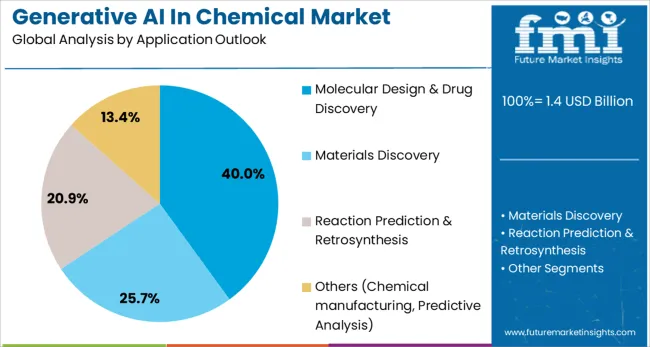
Molecular design and drug discovery are expected to represent 40% of the application segment in 2025. This dominant share reflects the critical importance of AI technologies in accelerating pharmaceutical research and development processes. Molecular design applications leverage generative AI to create novel chemical structures, predict biological activity, and optimize drug properties while reducing the need for extensive experimental screening. The segment benefits from significant pharmaceutical industry investment and regulatory support for AI-assisted drug development approaches.
The generative AI in chemical market is advancing rapidly due to increasing pharmaceutical research costs and growing recognition of AI technology potential for accelerating chemical discovery. However, the market faces challenges including data quality and availability limitations, regulatory uncertainty for AI-designed compounds, and need for specialized computational expertise. Technology validation and intellectual property considerations continue to influence market development and adoption strategies.
The growing deployment of sophisticated generative adversarial networks (GANs) and variational autoencoders (VAEs) is enabling creation of novel molecular structures with optimized properties for specific applications. Advanced generative models provide enhanced capability for exploring chemical space and identifying compounds with desired characteristics while maintaining synthetic accessibility. Integration with quantum computing technologies enables more accurate molecular property prediction and enhanced computational efficiency for complex chemical systems.
Modern generative AI platforms are incorporating multi-modal approaches that combine molecular structure, biological activity, and synthesis pathway optimization in comprehensive chemical design workflows. Integration of natural language processing and reinforcement learning enables automated literature analysis and synthesis route planning that streamline research and development processes. Advanced AI systems also support real-time experimental feedback integration and adaptive learning capabilities for continuous model improvement.
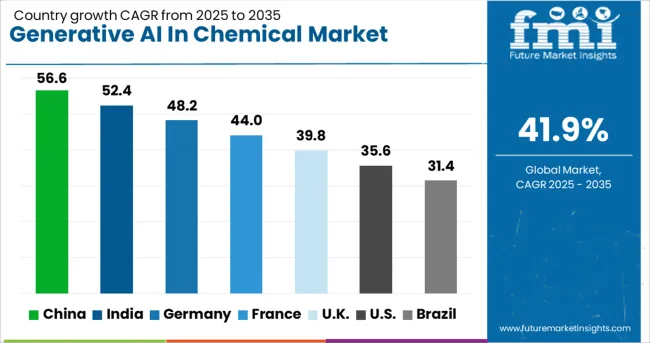
| Country | CAGR (2025 to 2035) |
|---|---|
| China | 56.6% |
| India | 52.4% |
| Germany | 48.2% |
| France | 44% |
| United Kingdom | 39.8% |
| United States | 35.6% |
| Brazil | 31.4% |
The generative AI in chemical market demonstrates exceptional growth across major economies, with China leading at a 56.6% CAGR through 2035, driven by massive AI technology investment and expanding pharmaceutical research capabilities. India follows at 52.4%, supported by growing biotechnology sector and increasing computational chemistry adoption. Germany records 48.2% growth, emphasizing chemical industry innovation and AI research excellence. France shows 44% expansion, driven by pharmaceutical sector development and government AI initiatives. The United Kingdom demonstrates 39.8% growth, focusing on drug discovery applications and academic research leadership. The United States records 35.6% growth, supported by established pharmaceutical infrastructure, while Brazil grows at 31.4% with developing AI research capabilities.
The report covers an in-depth analysis of 40+ countries; top-performing countries are highlighted below.
Revenue from generative AI in chemical applications in China is projected to exhibit the highest growth rate with a CAGR of 56.6% through 2035, driven by comprehensive government AI development initiatives and massive investment in pharmaceutical research capabilities. The country's expanding biotechnology sector and increasing emphasis on drug discovery innovation are creating significant demand for advanced AI technologies in chemical research. Major pharmaceutical companies and research institutions are establishing comprehensive AI platforms to support the growing requirements of molecular design and chemical synthesis optimization.
Government AI development policies are mandating advancement of artificial intelligence capabilities in strategic industries including pharmaceuticals and chemicals, driving investment in generative AI technologies throughout major research and industrial centers. Biotechnology development programs are supporting establishment of advanced computational facilities and international collaboration initiatives that enhance AI research capabilities across chemical and pharmaceutical networks.
Revenue from generative AI in chemical applications in India is expanding at a CAGR of 52.4%, supported by rapidly growing biotechnology sector and increasing adoption of computational chemistry methodologies across pharmaceutical research organizations. The country's expanding pharmaceutical industry and growing emphasis on contract research services are driving demand for AI technologies that can accelerate drug discovery and chemical optimization processes. Technology companies and research institutions are gradually establishing advanced AI capabilities to serve the growing requirements of pharmaceutical and chemical research applications.
Biotechnology sector development and pharmaceutical research expansion initiatives are creating opportunities for generative AI solution providers that can deliver scalable technologies and comprehensive research support services. Professional research development and international collaboration programs are building computational expertise among research organizations, enabling AI technology deployment that meets international pharmaceutical industry standards and regulatory requirements.
Demand for generative AI in chemical applications in Germany is projected to grow at a CAGR of 48.2%, supported by the country's leadership in chemical industry innovation and comprehensive AI research capabilities. German chemical and pharmaceutical companies are implementing advanced generative AI systems that meet stringent quality standards and regulatory compliance requirements. The market is characterized by focus on precision chemistry applications, advanced algorithm development, and compliance with comprehensive safety and efficacy standards.
Chemical industry investments are prioritizing AI technologies that demonstrate superior research acceleration and innovation capabilities while meeting German regulatory standards and environmental compliance requirements. Professional research certification programs are ensuring comprehensive technical expertise among researchers and technology providers, enabling specialized AI applications that support diverse chemical and pharmaceutical research requirements.
Demand for generative AI in chemical applications in France is expanding at a CAGR of 44%, driven by pharmaceutical sector development and comprehensive government AI innovation programs across research and industrial sectors. French pharmaceutical companies are incorporating advanced AI technologies that support drug discovery acceleration and chemical synthesis optimization. The market benefits from established research infrastructure and comprehensive government support for AI technology advancement.
Pharmaceutical development programs are facilitating adoption of generative AI solutions that provide enhanced research capabilities and accelerated compound discovery while supporting innovative medicine development objectives. Professional research development initiatives are ensuring comprehensive capabilities among scientific professionals, enabling specialized AI technology deployment that meets evolving pharmaceutical research requirements and regulatory standards.
Demand for generative AI in chemical applications in the United Kingdom is projected to grow at a CAGR of 39.8%, supported by established pharmaceutical industry presence and comprehensive academic research leadership in computational chemistry. British pharmaceutical companies and research institutions are implementing generative AI systems that provide enhanced drug discovery capabilities and chemical optimization. The market is characterized by focus on innovative research applications, comprehensive validation protocols, and advanced academic-industry collaboration.
Pharmaceutical research investments are enabling deployment of AI technologies that demonstrate superior compound discovery and optimization capabilities while maintaining rigorous scientific validation standards. Professional academic development programs are ensuring specialized expertise among researchers and technology developers, enabling comprehensive AI applications supporting evolving drug discovery requirements and regulatory approval processes.
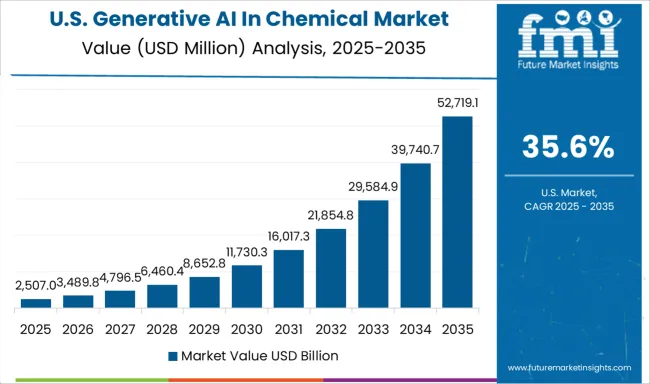
Demand for generative AI in chemical applications in the United States is expanding at a CAGR of 35.6%, driven by established pharmaceutical infrastructure and continued innovation in AI technology applications for chemical research. American pharmaceutical companies and technology providers are maintaining comprehensive generative AI capabilities through adoption of advanced algorithms and computational platforms. The market benefits from substantial venture capital investment and established biotechnology industry leadership.
Pharmaceutical technology investments are enabling continued advancement of AI applications through integration of innovative generative models and comprehensive research platforms. Professional development programs are maintaining technical expertise among researchers and technology professionals, enabling comprehensive AI capabilities that support diverse pharmaceutical research requirements and emerging therapeutic applications.
Revenue from generative AI in chemical applications in Brazil is growing at a CAGR of 31.4%, driven by developing AI research capabilities and increasing interest in computational chemistry applications across pharmaceutical and chemical sectors. Brazilian research institutions and pharmaceutical companies are investing in AI technologies that can support research acceleration and innovation development. Technology providers and research organizations are establishing AI capabilities to serve evolving research requirements.
Research development programs are facilitating adoption of generative AI technologies that support comprehensive chemical research applications across diverse academic and industrial environments. Professional capability development initiatives are enhancing computational expertise among researchers and technology professionals, enabling AI technology deployment that meets evolving research requirements and international collaboration standards.
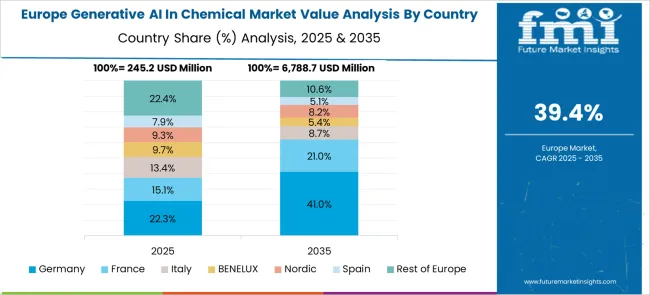
The generative AI in chemical market in Europe is projected to grow substantially across major countries, with Germany leading the regional market development. The United Kingdom maintains strong interest in AI chemical research, supported by established pharmaceutical industry presence and comprehensive academic research capabilities. France demonstrates consistent investment in AI technology development, driven by government innovation programs and chemical industry modernization initiatives.
Germany is expected to maintain its leadership position in European generative AI chemical applications, supported by its advanced chemical industry infrastructure and comprehensive research and development capabilities. The country benefits from established pharmaceutical companies and supportive regulatory environment for AI technology adoption.
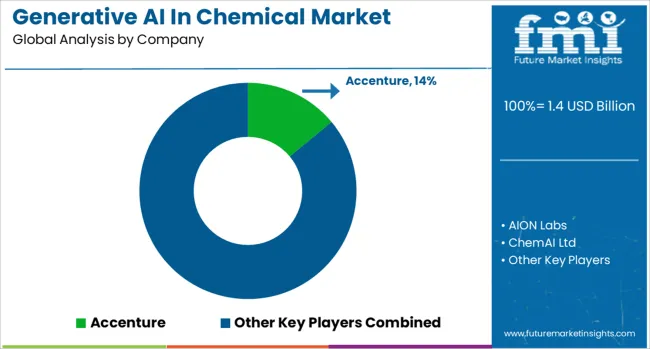
The generative AI in chemical market is defined by competition among technology companies, pharmaceutical corporations, and specialized AI solution providers. Companies are investing in advanced machine learning algorithms, comprehensive chemical databases, specialized computational platforms, and domain expertise to deliver accurate, scalable, and innovative AI solutions for chemical research and development. Strategic partnerships, algorithm development, and market expansion strategies are central to strengthening technology portfolios and research collaborations.
Accenture plc, United States-based, offers comprehensive AI consulting and implementation services with focus on chemical and pharmaceutical industry digital transformation. AION Labs, Israel, provides specialized AI platforms for pharmaceutical research and drug discovery applications. ChemAI Ltd, United Kingdom, delivers advanced chemical AI solutions with emphasis on molecular design and synthesis optimization. Google LLC, United States, focuses on AI technology platforms and machine learning infrastructure supporting chemical research applications. HELM AG, Germany, emphasizes specialized chemical distribution and AI-powered supply chain optimization. IBM Corporation, United States, provides comprehensive AI platforms and quantum computing capabilities for chemical research. Microsoft Corporation, United States, offers cloud-based AI services and computational platforms for pharmaceutical applications. Mitsui Chemicals Inc., Japan, NVIDIA Corporation, United States, and Omya AG, Switzerland, provide specialized AI expertise, advanced computational hardware, and comprehensive chemical industry solutions across global pharmaceutical and chemical research markets.
| Item | Value |
|---|---|
| Quantitative Units | USD 47.3 billion |
| Technology | Machine learning, generative models (GAN & VAE), deep learning, molecular docking (quantum computing), GNN, others (NLP, reinforcement learning) |
| Application | Molecular design & drug discovery, materials discovery, reaction prediction & retrosynthesis, others (chemical manufacturing, predictive analysis) |
| Regions Covered | North America, Europe, East Asia, South Asia & Pacific, Latin America, Middle East & Africa |
| Country Covered | United States, Canada, United Kingdom, Germany, France, China, Japan, South Korea, India, Brazil, Australia and 40+ countries |
| Key Companies Profiled | Accenture plc, AION Labs, ChemAI Ltd, Google LLC, HELM AG, IBM Corporation, Microsoft Corporation, Mitsui Chemicals Inc., NVIDIA Corporation, Omya AG |
| Additional Attributes | Dollar sales by technology and application, regional demand trends across North America, Europe, and Asia-Pacific, competitive landscape with established technology companies and specialized AI solution providers, development capabilities for different chemical research applications and computational requirements, integration with advanced machine learning algorithms and quantum computing platforms, innovations in generative model architectures and multi-modal AI approaches, and adoption of automated synthesis planning systems with enhanced predictive accuracy and comprehensive chemical database integration for accelerated molecular discovery and optimization. |
The global generative AI in chemical market is estimated to be valued at USD 1.4 billion in 2025.
The market size for the generative AI in chemical market is projected to reach USD 47.3 billion by 2035.
The generative AI in chemical market is expected to grow at a 41.9% CAGR between 2025 and 2035.
The key product types in generative AI in chemical market are machine learning, generative models (gan & vae), deep learning, molecular docking (quantum computing), gnn and others (nlp, reinforcement learning).
In terms of application outlook, molecular design & drug discovery segment to command 40.0% share in the generative AI in chemical market in 2025.






Our Research Products

The "Full Research Suite" delivers actionable market intel, deep dives on markets or technologies, so clients act faster, cut risk, and unlock growth.

The Leaderboard benchmarks and ranks top vendors, classifying them as Established Leaders, Leading Challengers, or Disruptors & Challengers.

Locates where complements amplify value and substitutes erode it, forecasting net impact by horizon

We deliver granular, decision-grade intel: market sizing, 5-year forecasts, pricing, adoption, usage, revenue, and operational KPIs—plus competitor tracking, regulation, and value chains—across 60 countries broadly.

Spot the shifts before they hit your P&L. We track inflection points, adoption curves, pricing moves, and ecosystem plays to show where demand is heading, why it is changing, and what to do next across high-growth markets and disruptive tech

Real-time reads of user behavior. We track shifting priorities, perceptions of today’s and next-gen services, and provider experience, then pace how fast tech moves from trial to adoption, blending buyer, consumer, and channel inputs with social signals (#WhySwitch, #UX).

Partner with our analyst team to build a custom report designed around your business priorities. From analysing market trends to assessing competitors or crafting bespoke datasets, we tailor insights to your needs.
Supplier Intelligence
Discovery & Profiling
Capacity & Footprint
Performance & Risk
Compliance & Governance
Commercial Readiness
Who Supplies Whom
Scorecards & Shortlists
Playbooks & Docs
Category Intelligence
Definition & Scope
Demand & Use Cases
Cost Drivers
Market Structure
Supply Chain Map
Trade & Policy
Operating Norms
Deliverables
Buyer Intelligence
Account Basics
Spend & Scope
Procurement Model
Vendor Requirements
Terms & Policies
Entry Strategy
Pain Points & Triggers
Outputs
Pricing Analysis
Benchmarks
Trends
Should-Cost
Indexation
Landed Cost
Commercial Terms
Deliverables
Brand Analysis
Positioning & Value Prop
Share & Presence
Customer Evidence
Go-to-Market
Digital & Reputation
Compliance & Trust
KPIs & Gaps
Outputs
Full Research Suite comprises of:
Market outlook & trends analysis
Interviews & case studies
Strategic recommendations
Vendor profiles & capabilities analysis
5-year forecasts
8 regions and 60+ country-level data splits
Market segment data splits
12 months of continuous data updates
DELIVERED AS:
PDF EXCEL ONLINE
Generative AI Market Analysis - Trends & Forecast 2025 to 2035
Generative AI in Packaging Market Size and Share Forecast Outlook 2025 to 2035
Generative AI in Logistics Market Size and Share Forecast Outlook 2025 to 2035
Regenerative Agriculture Market Size and Share Forecast Outlook 2025 to 2035
Regenerative Blowers Market Growth – Trends & Forecast 2025 to 2035
Regenerative Thermal Oxidizer Market Growth – Trends & Forecast 2025-2035
Regenerative Braking System Market Size and Share Forecast Outlook 2025 to 2035
Regenerative Turbine Pump Market Size and Share Forecast Outlook 2025 to 2035
Regenerative Medicine Market Growth – Trends & Forecast 2025 to 2035
Regenerative Biologic Injectables Market Size and Share Forecast and Outlook 2025 to 2035
Regenerative Artificial Skin Market Size and Share Forecast Outlook 2025 to 2035
Neurodegenerative Disease Market Size and Share Forecast Outlook 2025 to 2035
Veterinary Regenerative Medicine Market Size and Share Forecast Outlook 2025 to 2035
Automotive Regenerative Braking Market Size and Share Forecast Outlook 2025 to 2035
Antimicrobial Regenerative Wound Matrix Market - Growth & Forecast 2025 to 2035
Veterinary Neurodegenerative Disease Diagnostics Market Size and Share Forecast Outlook 2025 to 2035
Air Struts Market Size and Share Forecast Outlook 2025 to 2035
AI-powered Wealth Management Solution Market Size and Share Forecast Outlook 2025 to 2035
AI Document Generator Market Size and Share Forecast Outlook 2025 to 2035
Air Caster Skids System Market Size and Share Forecast Outlook 2025 to 2035

Thank you!
You will receive an email from our Business Development Manager. Please be sure to check your SPAM/JUNK folder too.
Chat With
MaRIA